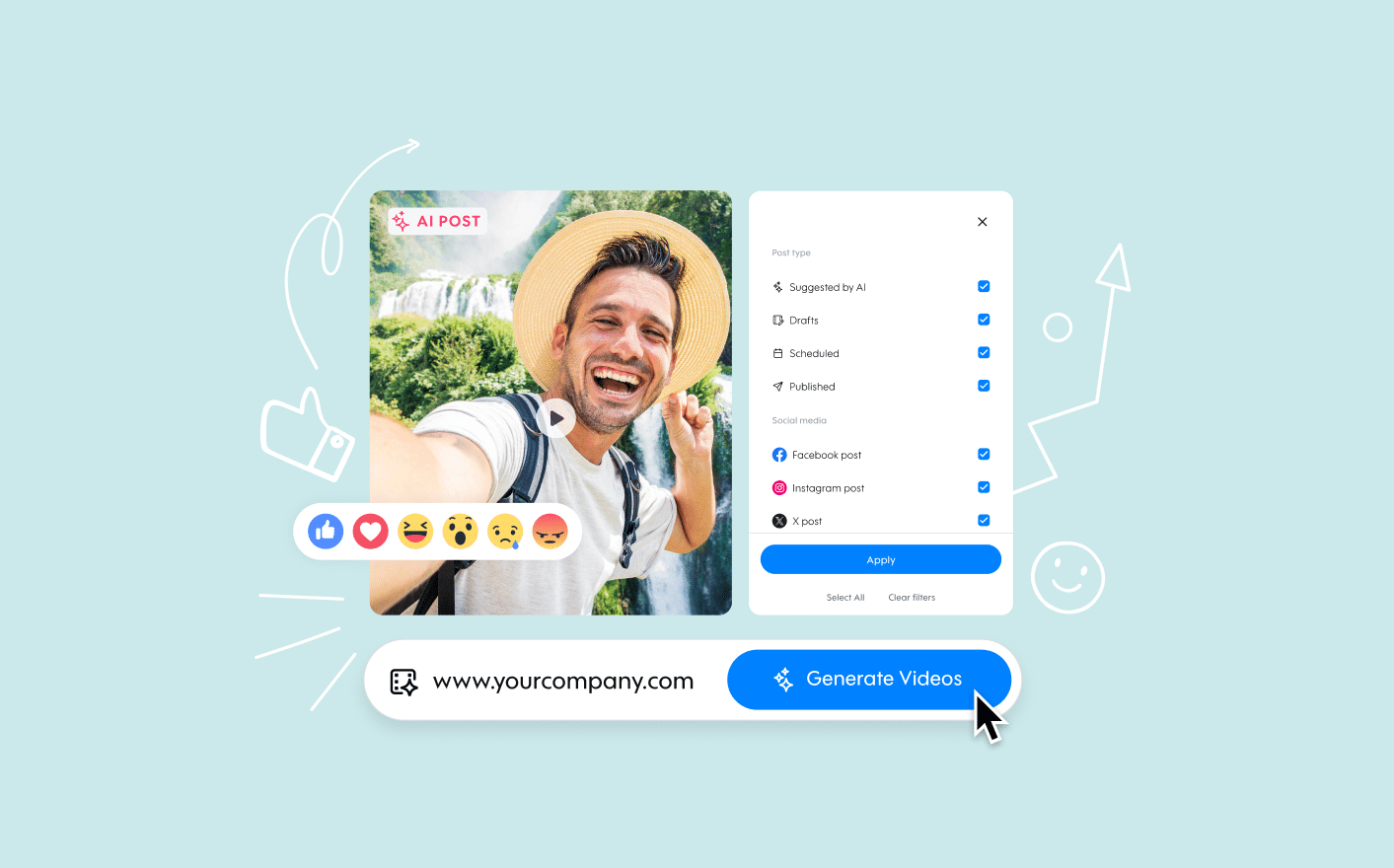
6 Ways Small Businesses Can Use AI to Scale in 2024
The integration of AI is no longer just a privilege of large corporations. In fact, nearly half (48%) of small businesses have adopted AI tools in the past year, and an additional 29% have been harnessing this technology for 1-2 years. Among those who consider themselves AI experts, a whopping 88% view AI as a game-changer or a valuable asset for their business.
This surge in AI adoption among small businesses is a testament to the technology’s accessibility and myriad capabilities. In this blog post, we’ll explore six critical areas where AI can help small businesses grow and scale operations.
Getting Started with AI
Adopting AI technology can seem daunting, especially for small businesses that might not have the same resources as larger corporations. However, with the right approach and understanding, integrating AI into your business operations can be both feasible and transformative. Here are some practical tips and important considerations for small businesses looking to embrace AI technologies.
- Assess Your Needs: Before diving into AI, it’s crucial to identify the areas of your business that will benefit most from automation and enhanced analytics. Whether it’s customer service, marketing, or operational efficiency, understanding your needs will help you choose the right AI solutions that offer the best return on investment.
- Start Small: You don’t need to overhaul your entire business model to benefit from AI. Start with small, manageable projects that can deliver quick wins. For example, implementing a chatbot for handling common customer queries can free up human resources for more complex tasks, thus improving overall efficiency.
- Consider Costs and ROI: While AI can drive significant benefits, it also comes with costs. These can include the expenses of technology, as well as training and potentially hiring new staff. Consider the return on investment by analyzing how much time and resources AI can save, and how it might increase revenue or customer satisfaction.
- Gain the Necessary Expertise: AI requires a certain level of technical expertise. Small businesses must either train existing staff or recruit new talent skilled in AI technologies. Alternatively, partnering with AI vendors or hiring consultants can bridge the expertise gap.
- Measure and Adapt: Once you’ve implemented AI tools, continually measure their performance and impact on your business. Use these insights to refine your AI strategies, enhance existing applications, and plan further integrations.
Understanding AI and Its Capabilities
Artificial Intelligence (AI) refers to the simulation of human intelligence in machines that are programmed to think like humans and mimic their actions. AI can range from simple algorithms capable of basic tasks to advanced systems that learn and adapt over time. There are several types of AI technologies that small businesses can leverage, each serving different purposes:
- Machine Learning (ML): This involves algorithms that enable software applications to become more accurate in predicting outcomes without being explicitly programmed. For example, ML can help businesses in demand forecasting or customer behavior analysis.
- Natural Language Processing (NLP): NLP technologies help computers understand, interpret, and generate human language. Small businesses can use NLP tools for customer service bots, sentiment analysis of customer reviews, or automated content creation.
- Robotic Process Automation (RPA): RPA tools are used to automate routine and repetitive tasks, which can significantly reduce the workload for human employees. This allows small businesses to allocate their resources to more strategic tasks.
Incorporating AI into operations can be a game changer for small businesses. It not only enhances efficiency and productivity but also provides insights into customer behaviors and market trends, which can lead to better decision-making. With AI, small businesses can automate mundane tasks, personalize marketing strategies, and improve customer experiences, all of which are crucial for scaling and competing in today’s market.
How to Use AI to Scale Your Business
Scaling a business effectively requires more than just increasing sales; it involves enhancing operations, improving customer service, and optimizing marketing strategies. By integrating AI into various aspects of your business, you can automate processes, gain deeper insights into your market, and create more personalized customer experiences. Let’sl explore some practical ways small businesses can deploy AI to not only grow in size but also in efficiency and sophistication.
1. Enhancing Customer Experience
In the competitive business landscape, delivering an exceptional customer experience is paramount. AI offers powerful tools that can significantly enhance the quality of interactions between your business and your customers.
- Chatbots: AI-powered chatbots can handle a multitude of customer service inquiries without human intervention, offering rapid responses around the clock. This immediacy and consistency in customer service can greatly enhance customer satisfaction. Chatbots are capable of learning from interactions to improve their responses over time, ensuring that the customer experience is continuously evolving and improving.
- Personalized Recommendations: AI can also tailor product or service recommendations to individual customer preferences based on their past behavior and data. This personalization makes customers more likely to find products they love, which not only increases the likelihood of purchases but also boosts customer loyalty.
The benefits of improved customer service facilitated by AI are profound. Firstly, it enhances customer retention by consistently meeting (and exceeding) customer expectations. Happy customers are more likely to return and also to recommend your business to others, thereby assisting in customer acquisition through word-of-mouth. Furthermore, efficient AI-driven services reduce the load on human employees, allowing them to focus on more complex and nuanced customer interactions or other areas where human oversight is crucial.
2. Automating Marketing Efforts
The use of AI in marketing not only streamlines operations but also brings precision and personalization to campaigns that were previously not possible at scale. By integrating AI into your marketing strategies, you can automate and optimize numerous tasks, from ad targeting to content creation and email marketing. This automation can significantly extend your marketing capabilities, enabling you to reach new markets and improve your marketing return on investment (ROI).
- Targeted Ads: AI excels in analyzing vast amounts of data to identify patterns and preferences among your potential customers. This capability allows for highly targeted advertising that can place your brand in front of the right audience at the right time, on the right platform. By minimizing wastage on poorly targeted advertising, AI helps you allocate your budget more effectively, enhancing the overall efficiency of your marketing spend.
- Content Creation: AI-powered tools can also assist in content creation by generating creative text, visuals, and even video content tailored to the preferences of your audience. This not only speeds up content production but also ensures that it is optimized for engagement and conversion, helping to capture and retain the interest of potential customers.
- Email Marketing: In email marketing, AI can be used to personalize messages based on user behavior and preferences, optimize send times for maximum open rates, and even analyze the responses to improve future campaigns. This level of personalization and optimization is key in making email marketing a powerful tool for customer retention and conversion.
Promo Tip: PromoAI Creative Copilot is a revolutionary AI tool for small businesses looking to maintain a dynamic presence on social media while facing time and budget constraints. This innovative marketing assistant seamlessly integrates an ultra-fast AI-powered creative engine with an intuitive chat-based editor, empowering users to streamline their workflow and maximize efficiency.
3. Improving Financial Management
Effective financial management is crucial for the growth and sustainability of any business. AI technologies offer transformative solutions that not only enhance accuracy but also provide deeper insights, helping small businesses make more informed financial decisions.
- Financial Forecasting and Budgeting: AI can analyze historical financial data to predict future trends and outcomes with a high degree of accuracy. This capability allows businesses to anticipate future financial conditions, helping them to plan and allocate resources more effectively. AI-driven financial models can identify potential revenue streams and highlight areas where costs can be cut, thereby optimizing the budgeting process. The predictive power of AI supports strategic planning, ensuring businesses are prepared for various financial scenarios.
- Fraud Detection and Risk Management: AI excels in identifying patterns and anomalies that may indicate fraudulent activity. By continuously monitoring financial transactions and comparing them against historical data, AI systems can quickly flag unusual transactions that could be indicative of fraud. This early detection is crucial in minimizing potential losses and protecting the company’s assets. Furthermore, AI can assess risk levels associated with different business decisions, providing guidance based on data-driven risk analysis. This helps businesses avoid costly mistakes and make decisions that align with their risk tolerance and financial goals.
By leveraging AI in these financial management tasks, businesses can not only safeguard their assets but also optimize their financial operations. The enhanced accuracy and deep insights provided by AI lead to better financial health and more robust growth opportunities.
4. Talent Acquisition and Human Resources
As small businesses scale, the need for an effective, efficient hiring process and robust employee retention strategies becomes increasingly critical. AI-driven tools in the field of talent acquisition and human resources provide essential support in these areas, making it possible to handle these challenges with greater precision and insight.
- AI-Driven Recruitment Tools: AI can significantly streamline the recruitment process by automating the initial stages of candidate screening. These tools analyze resumes and evaluate candidates’ qualifications against job descriptions, quickly identifying the most promising applicants. This not only speeds up the hiring process but also ensures a higher quality of candidate fit by objectively assessing skills and experience against the specific needs of the business. Furthermore, AI can help eliminate unconscious biases, promoting a more diverse and inclusive workplace.
- Employee Engagement and Retention Tools: AI also plays a crucial role in monitoring and enhancing employee satisfaction. Tools that track various metrics of employee engagement can provide early warnings of potential turnover, allowing businesses to address issues proactively. By analyzing patterns in employee feedback and other engagement indicators, AI can suggest targeted interventions to improve workplace conditions and morale. These might include changes in team dynamics, workload adjustments, or enhancements in company culture.
The implementation of these AI tools helps businesses not only in hiring the right talent but also in nurturing and retaining them. This is particularly important for small businesses, where each employee’s contribution is vital and turnover can be costly. By ensuring a higher retention rate and a more engaged workforce, AI contributes directly to a stable, motivated team environment. This stability is essential for ongoing business growth and scaling, as it supports consistent performance and innovation across the organization.
5. Business Intelligence and Analytics
In today’s data-driven world, the ability to harness and interpret vast amounts of information is key to business success. AI-powered business intelligence and analytics tools give small businesses a competitive edge by providing deep insights into business performance, customer behavior, and market trends. These insights enable more informed strategic decisions, critical for businesses aiming to scale.
- Advanced Data Analytics: By leveraging AI, businesses can digest and analyze large datasets to uncover patterns and insights that would be indiscernible otherwise. This analysis can range from understanding customer purchasing behaviors and preferences to evaluating the effectiveness of marketing campaigns and operational efficiencies. AI-driven analytics tools help businesses identify strengths, weaknesses, opportunities, and threats in real-time, allowing them to adapt strategies swiftly and effectively.
- Predictive Analytics: One of the most powerful applications of AI in business intelligence is predictive analytics. This technology uses historical data and AI algorithms to forecast future trends. Predictive analytics can be applied to various aspects of a business, from forecasting customer demand and sales to anticipating market shifts and operational needs. By having a predictive outlook, businesses can better prepare for the future, ensuring they have the right inventory levels, staffing, and resource allocations to meet anticipated demands.
The integration of AI into business intelligence transforms raw data into actionable insights. For small businesses, this means not just surviving but thriving in competitive markets by making smarter, data-driven decisions. The ability to quickly adapt to new information and predict future trends is invaluable, allowing businesses to strategically maneuver and allocate resources efficiently.
6. Customer Insights and Market Research
Understanding customer needs and market dynamics is crucial for any business looking to scale. AI tools offer advanced capabilities for gaining deep insights into customer sentiments and behaviors, which are essential for refining marketing strategies and product offerings. The use of AI in customer insights and market research allows businesses to personalize their approach and effectively target different segments of the market.
- Sentiment Analysis: AI-powered sentiment analysis tools can scan and interpret customer feedback across various platforms—social media, customer reviews, forums, and more. By evaluating the tone and context of customer opinions, these tools provide an accurate gauge of brand perception and customer satisfaction. This continuous stream of insights helps businesses identify not just areas for improvement but also aspects of their service or product that are resonating well with customers. Adjusting business strategies based on these insights can lead to improved customer retention and acquisition.
- Market Segmentation Algorithms: AI also enhances market research through sophisticated market segmentation algorithms. These algorithms analyze customer data to classify individuals into distinct groups based on their behaviors, preferences, and demographic details. Understanding these segments allows businesses to tailor their marketing messages and product offerings to meet the specific needs and preferences of each group, enhancing the effectiveness of marketing campaigns and promotional strategies.
The strategic application of AI in understanding customer insights and conducting market research not only helps in fine-tuning marketing efforts but also in product development and customer service, ensuring that the business remains highly relevant and competitive in the market. For small businesses, this means being able to compete on a larger scale, using data-driven strategies to capture and retain a more substantial customer base.
Leveraging AI for Sustainable Business Growth
As we’ve explored, AI presents a multitude of opportunities for small businesses eager to scale and enhance their operational efficiency. From automating routine tasks and personalizing customer interactions to making data-driven strategic decisions, AI can significantly transform how small businesses operate and compete in the digital age.
To apply AI’s powerful capabilities toward your small business’s marketing efforts, try PromoAI Creative Copilot today to create quality video and social content 20 times faster than traditional tools.



